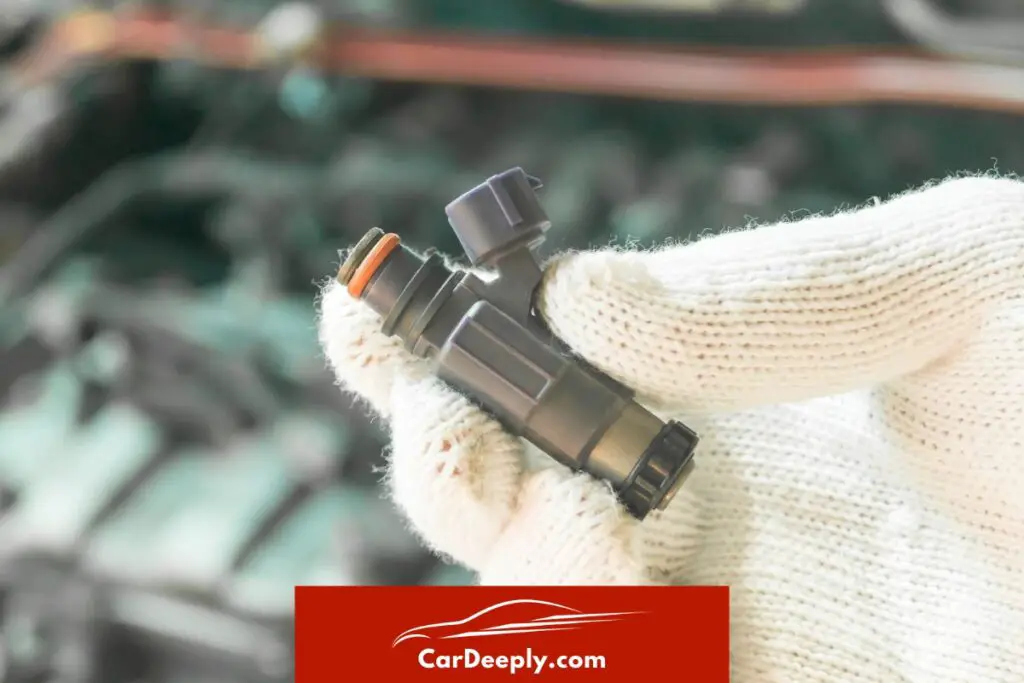Experiencing a car running rough after using a fuel injector cleaner can be quite a puzzle. This comprehensive guide is designed to demystify this issue, providing practical solutions and quick tips to get your vehicle back on track.
By delving into this article, you’ll gain the following:
- Insight into why this problem occurs
- Practical advice to troubleshoot and fix the issue
- Tips to prevent future occurrences after cleaning
So, buckle up and get ready to navigate the road to smoother engine performance.
Let’s dive in!
Advertising links are marked with *. We receive a small commission on sales, nothing changes for you.
Key Takeaways

- Fuel injectors play a crucial role in your car’s engine performance.
- Regular cleaning of fuel injectors prevents clogs and enhances fuel economy.
- A car may run rough after cleaning due to residual cleaner or dislodged deposits.
- Proper cleaning techniques and quality cleaner can prevent post-cleaning issues.
- Seek professional help if severe issues arise after cleaning fuel injectors.
What is a Fuel Injector and its Role in a Car
Fuel injectors are the unsung heroes of your car’s engine. They play a pivotal role in your vehicle’s overall performance and efficiency. These small yet powerful components deliver fuel into the engine’s combustion chamber.
The fuel is then ignited, propelling your car forward.
Let’s break down their key functions:
- Regulating fuel: Fuel injectors are like the gatekeepers of your engine. They meticulously control the fuel entering the machine, ensuring it’s neither too much nor too little. This precise regulation is crucial for maintaining the balance of the fuel-air mixture, which directly impacts the engine’s performance and your car’s fuel economy.
- Atomizing fuel: Fuel injectors have the important task of atomizing the fuel. They break the fuel into tiny particles, almost like a fine mist. This atomization process allows for more efficient combustion, which leads to better engine performance and fuel efficiency.
- Timing fuel delivery: Timing is everything when it comes to engine performance. Fuel injectors ensure fuel is delivered correctly during the engine cycle. This precise timing is crucial for optimal combustion and engine performance.
Why Do We Clean Fuel Injectors
Cleaning fuel injectors is a crucial part of maintaining your car’s performance. Over time, deposits from the fuel and the engine’s internal components can build up in the fuel injectors.
These deposits can interfere with the injector’s ability to deliver fuel efficiently.
Here’s why cleaning is essential:
- Prevents clogs: Cleaning removes these deposits that can clog the injectors. A clogged injector can disrupt fuel flow, leading to poor engine performance and reduced fuel economy.
- Improves fuel economy: Clean injectors ensure efficient fuel usage. When the injectors are clean, they can atomize the fuel more effectively, leading to better combustion and improved fuel economy.
- Enhances engine performance: Regular cleaning helps maintain optimal engine performance. Clean injectors can deliver fuel more efficiently and at the right time, ensuring smooth and optimal engine operation.
Specific Reasons Why a Car Runs Rough After Fuel Injector Cleaning
While cleaning fuel injectors is generally beneficial, it can sometimes lead to a car running rough. This can be quite puzzling, especially since cleaning is supposed to improve engine performance, not hinder it.
Here are some specific reasons why this might happen:
Residual Cleaner in the System
After cleaning, some cleaners might remain in the system. This residual cleaner can interfere with the combustion of the fuel. Instead of a clean, efficient burn, the presence of the cleaner might cause the fuel to burn unevenly or incompletely.
This can lead to a rough-running engine, as the combustion process is disrupted.
Disruption of Injector Calibration
The process of cleaning can sometimes disrupt the calibration of the fuel injector. Fuel injectors are finely tuned to deliver a precise amount of fuel in a specific spray pattern. If this calibration is disrupted, it can lead to an uneven fuel spray pattern.
This uneven distribution of fuel can cause the engine to run rough, as the balance of the fuel-air mixture is upset.
Dislodged Deposits
The cleaner can dislodge deposits that were previously not causing any issues. These dislodged deposits can clog the injectors, leading to a rough-running engine.
The clogged injector can disrupt the fuel flow, leading to an imbalance in the fuel-air mixture and causing the engine to run rough.
Damage to the Injector
In some cases, the cleaner might cause damage to the injector. This can affect its ability to deliver the right amount of fuel at the right time. If the injector is damaged, it might provide
How to Avoid Problems After Fuel Injector Cleaning
Avoiding problems after fuel injector cleaning is all about taking the right precautions.
Here are some practical steps you can follow:
- Use quality cleaner: Not all cleaners are created equal. Choose a cleaner that’s well-reviewed and suitable for your car’s engine.
- Follow instructions: Each cleaner comes with specific instructions. Follow them to the letter to avoid any mishaps.
- Run the engine: After cleaning, run the engine for a while. This helps to clear out any residual cleaner that might cause problems.
How to Clean Fuel Injectors Properly
Cleaning fuel injectors properly is key to avoiding issues.
Here’s a step-by-step guide:
- Purchase a quality cleaner: As mentioned, the cleaner you use matters. Do your research and choose wisely.
- Add the cleaner to your fuel tank: Most cleaners are designed to be added to your fuel tank. Follow the instructions on the bottle.
- Run your engine: After adding the cleaner, run your engine for a while to allow the cleaner to circulate through the injectors.
- Repeat as necessary: Depending on the state of your injectors, you might need to repeat the process.
Remember, it’s best to consult a professional if you need clarification on any step.
How Often Should You Clean Injectors
The frequency of cleaning your fuel injectors depends on several factors, including your car’s age, mileage, and overall condition.
Generally, consider cleaning your fuel injectors every 30,000 to 60,000 miles.
However, always refer to your vehicle’s manual for specific recommendations.
When to Seek Professional Help
While cleaning fuel injectors is a task you can do yourself, there are times when it’s best to seek professional help.
If you’re experiencing severe issues after cleaning, or if you’re not comfortable doing the cleaning yourself, don’t hesitate to consult a professional. They have the tools and expertise to diagnose and fix any issues effectively.
Frequently Asked Questions
Can I drive my car immediately after using a fuel injector cleaner?
Yes, you can. Driving your car for at least 5 to 10 miles after using a fuel injector cleaner is recommended. This helps circulate the cleaner through the injectors and remove residual deposits. However, it’s best to consult a professional if you notice any unusual engine behavior, such as rough idling or stalling.
How often should I use a fuel injector cleaner for preventive maintenance?
The frequency of using a fuel injector cleaner can vary depending on your vehicle’s make, model, and overall condition. However, a good rule of thumb is to use a cleaner every 3,000 to 5,000 miles. Refer to your vehicle’s manual or consult a professional for specific recommendations.
Can a fuel injector cleaner cause damage to my engine?
When used correctly, a fuel injector cleaner should not cause any damage to your engine. However, using a low-quality cleaner or not following the instructions properly can lead to issues. Always choose a well-reviewed cleaner and track the usage instructions to the letter.
What are the signs that my fuel injectors need cleaning?
Common signs that your fuel injectors might need cleaning include poor fuel economy, reduced engine performance, rough idling, and difficulty starting the engine. If you notice these signs, it might be time to clean your fuel injectors.
Can I clean my fuel injectors myself, or should I always seek professional help?
While cleaning your fuel injectors yourself using a fuel injector cleaner is possible, it’s always best to seek professional help if you need clarification. A professional can thoroughly clean the injectors and diagnose any potential issues causing your engine to run rough.
Conclusion
Fuel injector cleaning is a crucial part of maintaining your car’s performance. However, it has its potential issues.
By understanding these problems and how to avoid them, you can ensure your car runs smoothly after a fuel injector cleaning.
Remember, when in doubt, don’t hesitate to seek professional help. Safe driving!

Sebastian loves convertibles and drove a BMW 335i for a long time (325 hp is just a dream). Today, with two children, he is more concerned with SUVs and family-friendly vehicles. In addition to an Audi A4 Avant, he also drives a Cupra Formentor VZ – even as a family man, you can’t do without speed. Get to know Sebastian better and visit the About Us page.
Advertising links are marked with *. We receive a small commission on sales, nothing changes for you.

